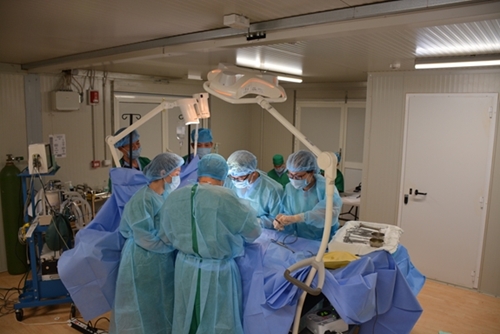One of such cases involved a patient from the Mongolian unit on the Bentiu base. He suffered severe abdominal pains due to acute appendicitis, which required an urgent appendectomy.
As usual, the chief surgeon of the operation was Major Lai Ba Thanh, M.D.. His assistants were Major Nguyen Thong Phan, Captain Nguyen Thi Phuong Thao, and Captain Pham Thi Thu Trang.
    |
 |
|
An operation performed by doctors of L2FH Rotation 1 of Vietnam |
The operation started at 2330 hours and was successfully completed at 0030 hours the next day. Captain Agvaan Osor, M.D. of the Mongolian unit shook hands with the operation team after the operation, expressing his gratitude and affirming that he would report the success of the operation to his commander. Nearly 4 days later, the patient recovered and was returned to the unit.
That was not the first time that L2FH Rotation 1 of Vietnam had smoothly handled acute appendicitis cases and an appendectomy was also one of the many operations performed by the doctors of F2FH Rotation 1 of Vietnam at UNMISS.
For Dr. Lai Ba Thanh, the most unforgettable memory was the 4-hour operation, which started at midnight, for a patient with intestinal necrosis. The patient was taken to the L2FH Rotation 1 of Vietnam in severe pains and weak health.
The staff of the L2FH of Vietnam decided to ask the UNMISS Chief Medical Officer for permission to perform an emergency operation, as the patient would most likely die from necrosis, complications, or multiple organ failure without surgery. Furthermore, there was not enough time to move the patient to a higher medical establishment either. Such cases are rare, even in Vietnam. The operation would certainly be easier in Vietnam because there is enough equipment and professional support. Eventually, the operation was successful and the patient was discharged from the hospital two weeks later. That operation was later considered a “highlight” of the medical sector in UNMISS and was known throughout the mission.
Major Nguyen Thanh Cong, Deputy Director of L2FH Rotation 1 of Vietnam, revealed that the people in South Sudan in general and in Bentiu in particular mostly contract infectious diseases, such as malaria, typhoid, and food poisoning. As for the U.N. staff, they often have appendicitis, cardiovascular diseases, trauma, and accidents that occur at work or during patrol.
At UNMISS, there are now five L2FHs in total. In Bentiu, there is only one L2FH, which is L2FH Rotation 1 of Vietnam. In other words, Vietnam’s L2FH is the highest medical facility in Bentiu. Therefore, there is a heavy and challenging workload for the Vietnamese doctors and nurses.
According to Chief Medical Officer of UNMISS Iqbal Mohd, Vietnam’s L2FH is responsible for taking medical care of more than 2,500 U.N. soldiers and staff stationed in Bentiu, while Doctors Without Borders (MSF) is responsible for treating locals. However, in some cases in which the MSF cannot handle or for those transferred from a level-one field hospital, the patients will be treated by Vietnam’s L2FH.
After more than 12 months of performing duties at the UNMISS, Vietnam’s L2FH Rotation 1 received and treated more than 2,000 patients and performed 62 operations of all kinds. All the patients treated by L2FH Rotation 1 of Vietnam recovered without complications. The hospital was highly appreciated by the medical sector of the mission.
The road to success is always rocky. L2FH Rotation 1 of Vietnam had to go through hard times when it was first deployed to South Sudan. In addition to strict regulations from such parties as the United Nations and the Ministry of Health of Vietnam, difficulties also came from the lack of facilities, language barriers, foreign customs and cultural practices, and more. However, the hospital gradually overcame those hardships and did its job well as it became highly valued by the United Nations and international friends.
Translated by Huu Duong
Part 4: Vietnam means goodness